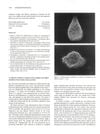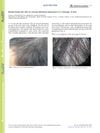9 citations,
July 2020 in “JAMA dermatology” Dermatoscopy can help diagnose CCCA without visible hair loss, offering a less invasive option than biopsy.
 8 citations,
January 2008 in “PubMed”
8 citations,
January 2008 in “PubMed” Mesotherapy for the scalp can cause severe infections, fat tissue death, and permanent hair loss.
 8 citations,
September 1993 in “British journal of dermatology/British journal of dermatology, Supplement”
8 citations,
September 1993 in “British journal of dermatology/British journal of dermatology, Supplement” A new method helps isolate key hair components to study hair growth and loss.
7 citations,
April 2022 in “Journal of pharmaceutical and biomedical analysis” The method can measure multiple steroids in human hair to study long-term steroid metabolism, especially in newborns and children.
 7 citations,
December 2002 in “PubMed”
7 citations,
December 2002 in “PubMed” The scalp has a natural speckled pattern of increased pigment around hair follicles, possibly linked to local hormone production.
 6 citations,
June 2019 in “Skin Research and Technology”
6 citations,
June 2019 in “Skin Research and Technology” Finasteride works for hair loss by maintaining existing hair follicles, not reversing miniaturization.
 6 citations,
January 2018 in “Journal of Cellular Physiology”
6 citations,
January 2018 in “Journal of Cellular Physiology” Human scalp fat stem cells showed improved cartilage-like development on a special scaffold with freeze-thaw treatment.
 6 citations,
June 2016 in “Journal of Craniofacial Surgery”
6 citations,
June 2016 in “Journal of Craniofacial Surgery” Reconstructing lower face gunshot injuries with a fibula and scalp flap is effective and gives good long-term results.
 6 citations,
January 2015 in “Indian Dermatology Online Journal”
6 citations,
January 2015 in “Indian Dermatology Online Journal” Too much levothyroxine can cause hair loss in infants.
 5 citations,
May 2020 in “Pharmaceutical Research”
5 citations,
May 2020 in “Pharmaceutical Research” Heat and chemicals improve finasteride delivery to scalp and hair follicles, potentially enhancing treatment for hair loss.
 5 citations,
January 2019 in “Skin appendage disorders”
5 citations,
January 2019 in “Skin appendage disorders” The conclusion is that it's important to tell apart alopecia areata from lipedematous alopecia for proper treatment, as alopecia areata can be reversed.
 4 citations,
June 2021 in “Wounds-a Compendium of Clinical Research and Practice”
4 citations,
June 2021 in “Wounds-a Compendium of Clinical Research and Practice” Chronic scalp lesions with crusts and pus that heal with strong topical steroids suggest Erosive Pustular Dermatosis, confirmed by biopsy showing specific immune cells.
 4 citations,
September 2012 in “Journal of dermatological science”
4 citations,
September 2012 in “Journal of dermatological science” The hair follicle's connective tissue is a key source of a certain collagen in human scalp skin.
4 citations,
January 2011 in “European journal of dermatology/EJD. European journal of dermatology” A boy had a rare scalp condition with thickened skin and different-colored hair.
 3 citations,
February 2019 in “Journal of Cosmetic Dermatology”
3 citations,
February 2019 in “Journal of Cosmetic Dermatology” The effects of estrogen on human scalp hair growth are unclear and need more research.
 2 citations,
June 2021 in “PubMed”
2 citations,
June 2021 in “PubMed” Chronic scalp lesions with crusts and pus indicate Erosive Pustular Dermatosis, which is confirmed by biopsy and effectively treated with strong topical steroids.
2 citations,
June 2013 in “Clinical and Experimental Dermatology” Thorough evaluation is crucial for understanding diffuse scalp hair loss.
 2 citations,
January 2011 in “Journal of Cosmetics, Dermatological Sciences and Applications”
2 citations,
January 2011 in “Journal of Cosmetics, Dermatological Sciences and Applications” Connective tissue diseases can affect the scalp.
2 citations,
September 1997 in “Archives of Dermatology”  1 citations,
December 2022 in “Actas dermo-sifiliográficas/Actas dermo-sifiliográficas”
1 citations,
December 2022 in “Actas dermo-sifiliográficas/Actas dermo-sifiliográficas” Sensitive scalp causes discomfort and hair loss, treated with personalized care.
 1 citations,
August 2021 in “Journal of The American Academy of Dermatology”
1 citations,
August 2021 in “Journal of The American Academy of Dermatology” Baricitinib helped improve hair, eyebrow, and eyelash growth in alopecia areata patients.
 1 citations,
July 2021 in “Journal of Skin and Sexually Transmitted Diseases”
1 citations,
July 2021 in “Journal of Skin and Sexually Transmitted Diseases” Lipedema is a painful fat disorder in women that's hard to treat, often worsens with hormonal changes, and requires symptom-focused therapies.
 1 citations,
January 2021 in “Turkish Journal of Medical Sciences”
1 citations,
January 2021 in “Turkish Journal of Medical Sciences” Women with telogen effluvium should be tested first for vitamin and mineral deficiencies.
 1 citations,
December 2020 in “Acta dermato-venereologica”
1 citations,
December 2020 in “Acta dermato-venereologica” Some scalp sores are linked to different inherited skin conditions.
 1 citations,
January 2018 in “Acta dermato-venereologica”
1 citations,
January 2018 in “Acta dermato-venereologica” A teenager's hair with alternating white and dark bands, known as Pili annulati, is a genetic condition that is usually harmless and often considered attractive.
 1 citations,
May 2016 in “Dermatologic Surgery”
1 citations,
May 2016 in “Dermatologic Surgery” The document concludes that using a phototrichogram with a protractor and tapeline is a reliable and noninvasive way to measure hair loss.
1 citations,
May 2011 in “Hair transplant forum international” Injectable ACell with blood serum/PRP may slow hair loss and regrow thinning hair.

Using scalp stem cells can improve hair transplants.
 November 2024 in “Medicina”
November 2024 in “Medicina” Recognizing scalp symptoms in PRP is crucial for proper diagnosis and treatment.
 October 2024 in “Experimental Dermatology”
October 2024 in “Experimental Dermatology” The belief about hair shedding phases is likely incorrect and needs reevaluation.























